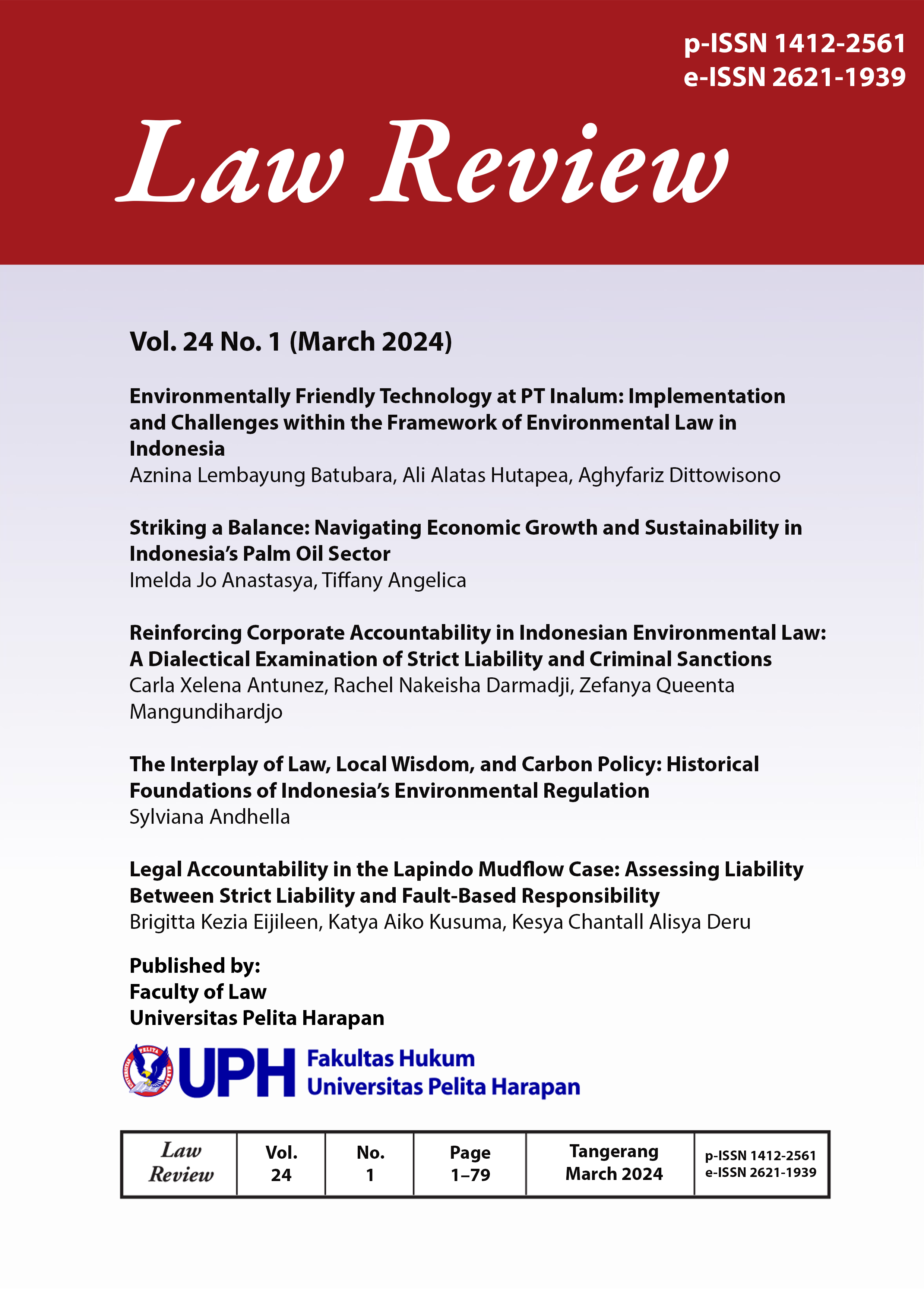The Interplay of Law, Local Wisdom, and Carbon Policy: Historical Foundations of Indonesia’s Environmental Regulation
DOI:
https://doi.org/10.19166/lr.v24i1.9752Keywords:
Carbon Emission, Local Wisdom, Environmental LawAbstract
Carbon emissions are one of the leading causes of climate change. Carbon consumption or carbon footprint has been a colossal topic because sustainability can be achieved through carbon emission reduction, as carbon emissions are one of the leading causes of climate change. Indonesia is actively working on environmental conservation, but it continues to face various challenges that require attention. Indonesia's commitment to reducing carbon emissions can be shown through its effort to shift toward low-carbon development. Implementing natural resource management laws in Indonesia has not gained popularity, as they are often viewed as unsupportive of environmental sustainability. The regulation is continuously updated and adjusted to address emerging environmental issues. This research aims to explore how local wisdom contributes to forest conservation using qualitative methodology in the Seruyan District, Central Kalimantan. While regulation on carbon trading in forestry is still ongoing, it can be enriched which states that the community has the same rights and opportunities to actively participate in environmental protection and management. The role of society can be providing advice, opinions, suggestions, objections, and complaints. In this case, the society is the local community that lives near the forest. Incorporating their knowledge of preserving nature and preventing forest fires into the policy can be beneficial.
References
Books
Carson, Rachel. Silent Spring. Greenwich: Fawcett Publication, 1964. https://library.uniteddiversity.coop/More_Books_and_Reports/Silent_Spring-Rachel_Carson-1962.pdf.
Journal Articles
Aagard, Todd S. “Environmental Harm, Use Conflicts, and Neutral Baselines in Environmental Law.” Duke Law Journal 60, no. 7 (2011): 1505–64, https://scholarship.law.duke.edu/dlj/vol60/iss7/1/.
Adamo, Nasrat, and Nadhir Al-Ansari. “In Old Babylonia: Irrigation and Agriculture Flourished Under the Code of Hammurabi (2000-1600 BC).” Journal of Earth Sciences and Geotechnical Engineering 10, no. 3 (2020): 1792–9660. https://www.researchgate.net/publication/339782821_In_Old_Babylonia_Irrigation_and_Agriculture_Flourished_Under_the_Code_of_Hammurabi_2000-1600_BC.
Ahmed, Abdelkader T., Fatma El Gohary, Vasileios A. Tzanakakis, and Andreas N. Angelakis. “Egyptian and Greek Water Cultures and Hydro-Technologies in Ancient Times.” Sustainability (Switzerland) 12, no. 22 (2020): 1–26. https://doi.org/10.3390/su12229760.
Dietz, Thomas. “Earth Day: 50 Years of Continuity and Change in Environmentalism.” One Earth 2, no. 4 (2020): 306–308. https://doi.org/10.1016/j.oneear.2020.04.003.
Fajarwati, N., and M. S. Masruri. “Role of Local Wisdom Community Dayak Kanayatn in the Fire Disaster Prevention (Forest Fires for the Opening of Farming Fields in West Kalimantan).” IOP Conference Series: Earth and Environmental Science 271 (2019): 1–9. https://doi.org/10.1088/1755-1315/271/1/012022.
Mulyono, Andreas Tedy. “Relaksasi Pengelolaan Sumber Daya Alam Dalam Diskursus Hukum Lingkungan Hidup Di Indonesia.” Law Review 19, no. 1 (2019): 25–53. https://doi.org/10.19166/lr.v19i1.1594.
Pramudianto, Andreas. “Dari Kyoto Protocol 1997 Ke Paris Agreement 2015: Dinamika Diplomasi Perubahan Iklim Global Dan Asean Menuju 2020.” Jurnal Politik Internasional 18, no. 1 (2016): 76–94. https://doi.org/https://doi.org/10.7454/global.v18i1.119.
Sada, Clarry, Yabit Alas, and Muhammad Anshari. “Indigenous People of Borneo (Dayak): Development, Social Cultural Perspective and Its Challenges.” Cogent Arts and Humanities 6, no. 1 (2019): 1–12. https://doi.org/10.1080/23311983.2019.1665936.
Uribe-Jaramillo, Maria Teresa. “Indonesia’s Forestry Policy at a Crossroads in the Sustainable Development Approach: A Case Study on the Forest Moratorium, 2011-2014.” Climate Change and the 2030 Corporate Agenda for Sustainable Development 19 (2016): 193–225. https://doi.org/10.1108/S2051-503020160000019010.
Thesis
Jones, Jack. “Conserving America: A History of America’s Conservation Movement and the Establishment of the National Park Service.” Senior Independent Study Theses, 2021. https://openworks.wooster.edu/cgi/viewcontent.cgi?article=12066&context=independentstudy.
News Articles
Kementrian Lingkungan Hidup dan Kehutanan. “Disidik Gakkum KLHK, Kasus Karhutla PT. Kumai Sentosa Segera Disidangkan.” Kementerian Lingkungan Hidup dan Kehutanan, April 2, 2020. https://ppid.menlhk.go.id/siaran_pers/browse/2398.
Riley, Trevor. “Companies ‘Zero Deforestation’ Pledges: Everything You Need to Know.” The Guardian, September 29, 2017. https://www.theguardian.com/sustainable-business/2017/sep/29/companies-zero-deforestation-pledges-agriculture-palm-oil-environment.
Septriani, Dian. “With G20 Presidency in Hand, Jokowi Turns Focus to COP26.” The Jakarta Post, November 1, 2021. https://www.thejakartapost.com/news/2021/11/01/with-g20-presidency-in-hand-jokowi-turns-focus-to-cop26.html.
Website Contents
Montrie, Chad. “Water Power, Industrial Manufacturing, and Environmental Transformation in 19th-Century New England.” Yale University, 2023. https://energyhistory.yale.edu/water-power-industrial-manufacturing-and-environmental-transformation-in-19th-century-new-england/.
Sistem Pemantauan Karhutla. “Indikasi Luka Kebakaran,” 2025. https://sipongi.menlhk.go.id/indikasi-luas-kebakaran.
Downloads
Published
How to Cite
Issue
Section
License
Copyright (c) 2025 Sylviana Andhella

This work is licensed under a Creative Commons Attribution-NonCommercial 4.0 International License.
Authors who publish with this journal agree to the following terms:
1) Authors retain copyright and grant the journal right of first publication with the work simultaneously licensed under a Creative Commons Attribution License (CC-BY-SA 4.0) that allows others to share the work with an acknowledgement of the work's authorship and initial publication in this journal.
2) Authors are able to enter into separate, additional contractual arrangements for the non-exclusive distribution of the journal's published version of the work (e.g., post it to an institutional repository or publish it in a book), with an acknowledgement of its initial publication in this journal.
3) Authors are permitted and encouraged to post their work online (e.g., in institutional repositories or on their website). The final published PDF should be used and bibliographic details that credit the publication in this journal should be included.





